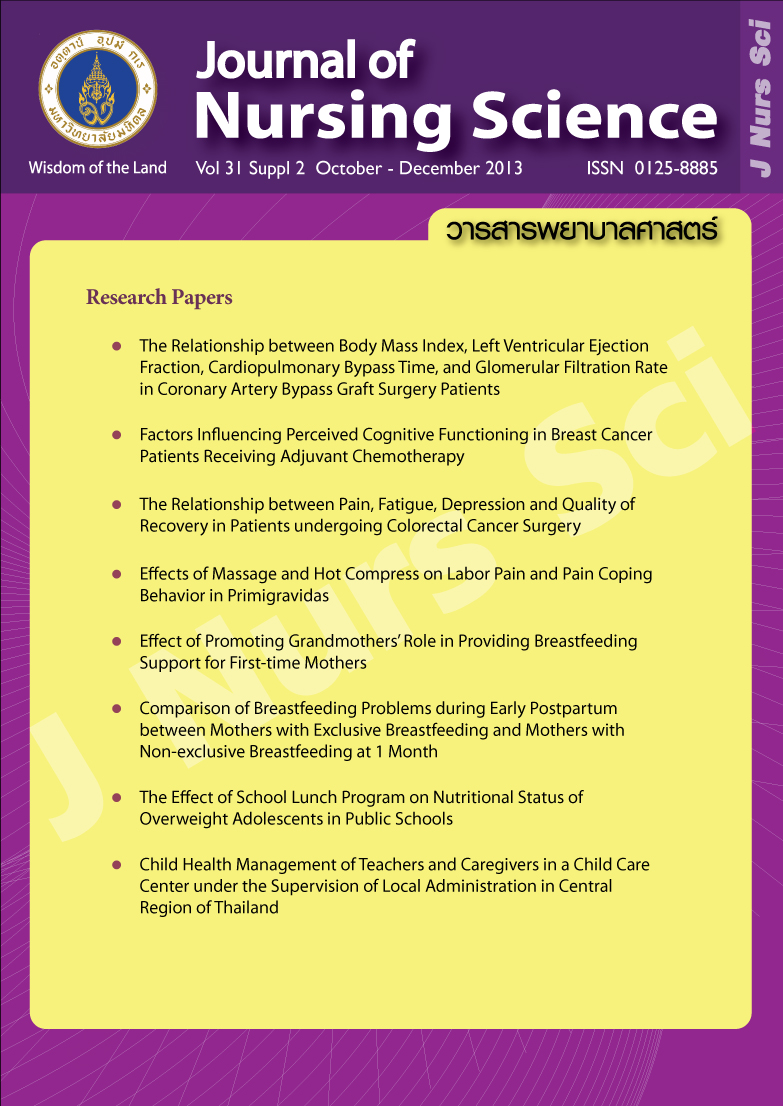Factors Influencing Perceived Cognitive Functioning in Breast Cancer Patients Receiving Adjuvant Chemotherapy
Main Article Content
Abstract
Purpose: This study aimed to examine the factors influencing perceived cognitive functioning in breast cancer patients receiving adjuvant chemotherapy.
Design: Correlational predictive research.
Methods: The study sample consisted of 84 breast cancer patients who were receiving adjuvant chemotherapy. The subjects were recruited by convenience sampling. Data were collected using 3 questionnaires: demographic data, the Hospital Anxiety and Depression Scale (HADS), and the Functional Assessment Cancer Therapy-Cognitive Function (FACT-Cog). Data were analyzed using descriptive statistics and multiple regression analysis.
Main findings: The research findings revealed that breast cancer patients perceived mild cognitive impairment (X = 82.33, SD = 26.77). Depression (β = - .41, p < .01), anxiety (β = - .40, p < .01), and amenorrhea (β = .21, p < .05) were found to be significantly influencing perceived cognitive functioning
that jointly explain 61% of the variance (p < .001). Disease comorbidity did not significantly influence on perceived cognitive functioning.
Conclusion and recommendations: Nurses should pay greater attention to, and perform assessment of cognitive functioning and its influencing factors in women with breast cancer while receiving chemotherapy. Nursing interventions to alleviate anxiety and depression should be implemented for effective management of cognitive functioning problems in breast cancer patients receiving chemotherapy.
ปัจจัยที่มีอิทธิพลต่อการรับรู้การทำหน้าที่ด้านการรู้คิดในผู้ป่วยมะเร็งเต้านมที่ได้รับยาเคมีบำบัดแบบเสริม
จรินทร โคตพรม, คนึงนิจ พงศ์ถาวรกมล, วิชชุดา เจริญกิจการ, นพดล โสภารัตนาไพศาล
บทคัดย่อ
วัตถุประสงค์: เพื่อศึกษาปัจจัยที่มีอิทธิพลต่อการรับรู้การทำหน้าที่ด้านการรู้คิดในผู้ป่วยมะเร็งเต้านมที่ได้รับยาเคมีบำบัดแบบเสริม
รูปแบบการวิจัย: ศึกษาความสัมพันธ์เชิงทำนาย
วิธีดำเนินการวิจัย: กลุ่มตัวอย่างเป็นผู้ป่วยมะเร็งเต้านมที่ได้รับการรักษาเสริมด้วยยาเคมีบำบัด จำนวน 84 ราย ใช้วิธีการเลือกกลุ่มตัวอย่างแบบสะดวกตามคุณสมบัติที่กำหนด เครื่องมือที่ใช้ในการเก็บรวบรวมข้อมูล ได้แก่ แบบบันทึกข้อมูลส่วนบุคคล แบบสอบถามภาวะวิตกกังวลและซึมเศร้า (HADS) แบบสอบถามการทำหน้าที่ด้านการรู้คิด (FACT-Cog) วิเคราะห์ข้อมูลโดยใช้สถิติเชิงพรรณนา และการวิเคราะห์ถดถอยพหุคูณ
ผลการวิจัย: กลุ่มตัวอย่างมีการรับรู้การทำหน้าที่ด้านการรู้คิดบกพร่องอยู่ในระดับเล็กน้อย (X = 82.33, SD = 26.77) ปัจจัยด้านภาวะซึมเศร้า (β = - .41, p < .01) ภาวะวิตกกังวล (β = - .40, p < .01) และ ภาวะไม่มีประจำเดือน (β = .21, p < .05) สามารถร่วมกันอธิบายความแปรปรวนของการรับรู้การทำหน้าที่ด้านการรู้คิดในผู้ป่วยมะเร็งเต้านม ที่ได้รับยาเคมีบำบัดแบบเสริมอย่างมีนัยสำคัญทางสถิติได้ร้อยละ 61 (p < .001) ส่วนการมีโรคร่วมไม่มีอิทธิพลต่อการรับรู้การทำหน้าที่ด้านการรู้คิด
สรุปและข้อเสนอแนะ: พยาบาลควรให้ความสำคัญและประเมินการทำหน้าที่ด้านการรู้คิดของผู้ป่วยมะเร็งเต้านมระหว่างได้รับยาเคมีบำบัด รวมทั้งประเมินปัจจัยที่มีอิทธิพล และควรวางแผนกิจกรรมการพยาบาลเพื่อลดภาวะวิตกกังวลและภาวะซึมเศร้า และจัดการช่วยเหลือผู้ป่วยมะเร็งเต้านมที่อยู่ในภาวะไม่มีประจำเดือน เพื่อการดูแลจัดการปัญหาการทำหน้าที่ด้านการรู้คิดแก่ผู้ป่วยมะเร็งเต้านมที่ได้รับยาเคมีบำบัดได้อย่างมีประสิทธิภาพ
คำสำคัญ: มะเร็งเต้านม เคมีบำบัด การทำหน้าที่ด้านการรู้คิด ภาวะวิตกกังวล ภาวะซึมเศร้า
Article Details
Copyright Notice: Nursing Science Journal of Thailand has exclusive rights to publish and distribute the manuscript and all contents therein. Without the journal’s permission, the dissemination of the manuscript in another journal or online, and the reproduction of the manuscript for non-educational purpose are prohibited.

Disclaimer: The opinion expressed and figures provided in this journal, NSJT, are the sole responsibility of the authors. The editorial board bears no responsibility in this regard.


